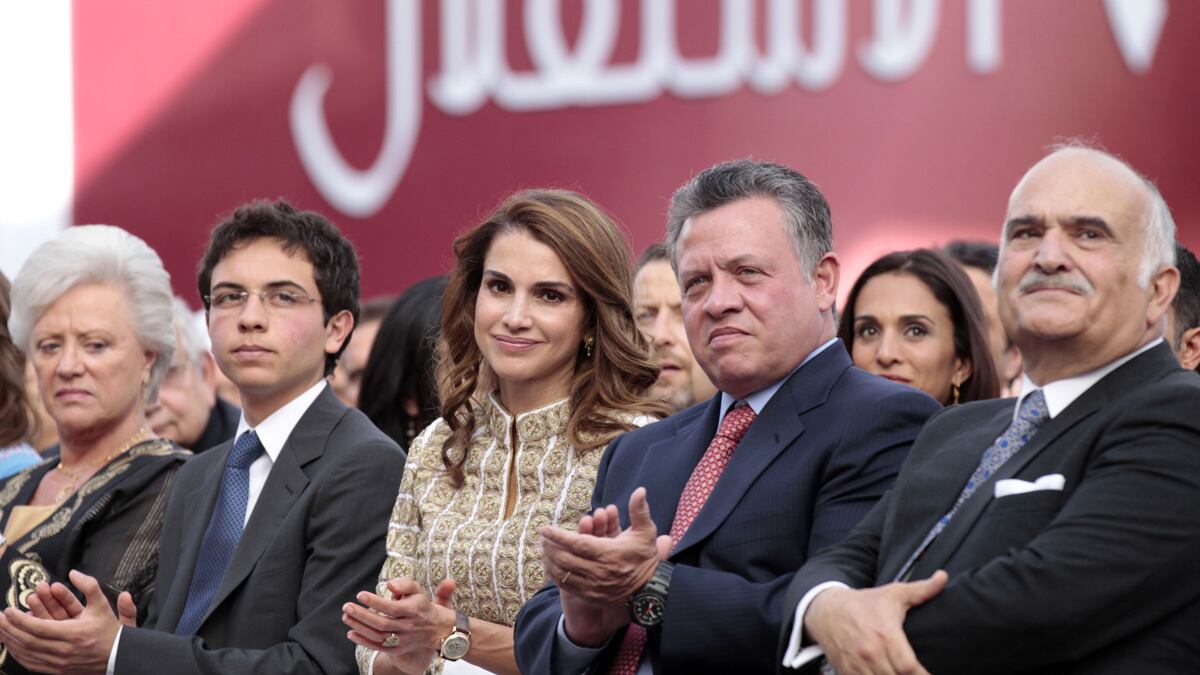
The blue-eyed king and beautiful queen of Jordan are facing the biggest crisis of their reign. On Tuesday night, riots and protests broke out in many of the country’s cities. Some in the crowd shouted “the people want the fall of the regime.” Others burned the monarch’s portrait. One longtime supporter of the royals even suggested privately “it’s not a question of if but when” King Abdullah’s rule will end. That may well be an overstatement. The protests included only a few thousand people all told. But the pressures for truly major political reforms are mounting.
“I think this ushers in the beginning of the end of absolute monarchy, not the monarchy,” says Labib Kamhawi, 61, a former political science professor at Jordan University who is now a spokesman for an umbrella group of opposition parties and movements. (Kamhawi is facing sedition charges from the nervous regime for, as he puts it, “saying what I am saying to you.”)
Monarchies traditionally rely on a mystique that blends bloodlines with patriotism, and throughout history the wisest royals have been those who managed to remain above the fray of day-to-day politics. The latest riots, which started over a hike in fuel prices, show that the 50-year-old Abdullah is finding that game increasingly hard to play.
One buffer after another between Abdullah and popular anger has fallen away: he has named four prime ministers in the last year alone. His powerful intelligence chiefs have toppled repeatedly since he succeeded to the throne in 1999, as he first relied on them for his survival, then fired them and threw them in prison.
In the past, protests often focused on Queen Rania, a brilliant and beautiful woman commonly seen as a power behind the throne. Although Rania’s humanitarian and educational work was known and appreciated around the world, her frequent appearances at fashion shows and in lavish photo spreads among other celebrities in magazines like Hello! made her an easy target for domestic resentments.
Rania is of Palestinian descent. Jordanians from traditional tribal backgrounds, always uneasy about the growing power and influence of the country’s Palestinian population, fantasized that she and the coterie of young businesspeople around her were plotting somehow to turn the country into a Palestinian state. (The king, who got his blue eyes from his British mother and whose Arabic was not entirely native, also has suffered from the impression that while he ruled over Jordan he was not entirely of Jordan.)
After Rania’s lavish celebrity-studded birthday party in 2010, attacks on her status and her motives grew more pointed, with a group of former generals publishing a letter that denounced her influential role in the monarchy.
King Abdullah, having failed to defend his prime ministers and turned on successive spymasters, did little to protect his wife’s reputation. But as she adopted a much lower profile, Abdullah’s prestige did not rise. Instead, discontent focused on the king. Now the monarch himself is increasingly alone before the people, and reliant more than ever before on foreign support.
The money Jordan’s government once received from the Gulf monarchies has grown increasingly scarce. Israeli Prime Minister Benyamin Netanyahu has a long and problematic record of tensions with the Jordanian monarchy, which is one of only two Arab governments to have signed an unpopular peace treaty with Israel. So American support for the Hashemite monarch is more important than ever.
Abdullah has promised political reforms, not least to shore up support in Washington. But the new electoral law was written in such a way that even after parliamentary elections scheduled for January, there will be no chance for the opposition to form a government without the king’s active approval. As a result, this cosmetic liberalization has done little or nothing to stem protests.
In Jordan, as in Egypt and many other Arab countries, the Muslim Brotherhood is a strong political force, and its members may be encouraging the current unrest. But the bedrock problem is economic. The financial demands on Jordan just keep growing. To maintain a vital agreement for support from the International Monetary Fund, Jordan must pare back its hugely expensive government subsidies for basic goods. But those make the difference for many Jordanians between hovering above the poverty line and sinking below it.
“There is a consensus that people are suffering already without having to bear added hardships,” says opposition leader Kamhawi. As in many other Arab countries, young people find it almost impossible to find good jobs. “They look at their future as being devastated by such measures while the government does nothing about corruption.”
In one of those twists that is typical of the Middle East and common in Jordan’s history, the fact that a horrendous civil war is going on next door in Syria may actually work to Abdullah’s benefit in the short term. To be sure, some 200,000 refugees have flooded into the country of 6 million people. But the threat to regional stability is such that no Western government or Arab power wants to see the Hashemite monarchy go down right now. “The Syrian situation is most important for the outside world,” says Kamhawi, suggesting that fact may have led the king to believe he has more room to maneuver politically and economically.
But the fates of other leaders who thought they were indispensable to Washington provide several cautionary examples, among them the fallen dictators of Tunisia, Yemen, and Egypt.




